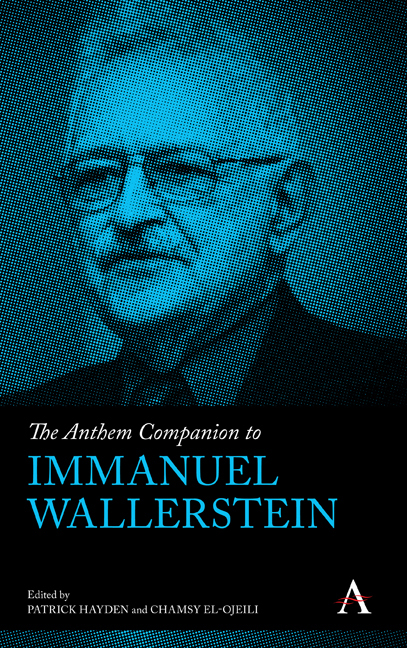Book contents
- Frontmatter
- Contents
- Notes on Contributors
- Acknowledgments
- Chapter 1 “There Is No Such Thing as Sociology”: Wallerstein as Sociologist
- Chapter 2 From Africa to the World: The Sources of Wallerstein’s The Modern World-System
- Chapter 3 Immanuel Wallerstein, World-Systems Analysis and the Structures of Knowledge
- Chapter 4 Wallerstein as International Political Sociologist: On Power, Hegemony and the Interstate System
- Chapter 5 The Agonies of Liberalism: Wallerstein on the Rise and Fall of Liberal Ideology
- Chapter 6 Global Inequalities Avant la Lettre: Theoretical Filiations and Radical Critique
- Chapter 7 Reckoning with Gender in the World-System: Insights from and Challenges to Wallerstein
- Chapter 8 The Past and Future of Antisystemic Movements: Possibilities and Limits of Social Change in Wallerstein’s World-Systems Analysis
- Chapter 9 The Global Environment and Climate Change inthe Modern World-System
- Chapter 10 Pervasive Pandemics: Understanding Global Healthand Disease from a World-Systems Perspective
- Index
Chapter 4 - Wallerstein as International Political Sociologist: On Power, Hegemony and the Interstate System
Published online by Cambridge University Press: 29 February 2024
- Frontmatter
- Contents
- Notes on Contributors
- Acknowledgments
- Chapter 1 “There Is No Such Thing as Sociology”: Wallerstein as Sociologist
- Chapter 2 From Africa to the World: The Sources of Wallerstein’s The Modern World-System
- Chapter 3 Immanuel Wallerstein, World-Systems Analysis and the Structures of Knowledge
- Chapter 4 Wallerstein as International Political Sociologist: On Power, Hegemony and the Interstate System
- Chapter 5 The Agonies of Liberalism: Wallerstein on the Rise and Fall of Liberal Ideology
- Chapter 6 Global Inequalities Avant la Lettre: Theoretical Filiations and Radical Critique
- Chapter 7 Reckoning with Gender in the World-System: Insights from and Challenges to Wallerstein
- Chapter 8 The Past and Future of Antisystemic Movements: Possibilities and Limits of Social Change in Wallerstein’s World-Systems Analysis
- Chapter 9 The Global Environment and Climate Change inthe Modern World-System
- Chapter 10 Pervasive Pandemics: Understanding Global Healthand Disease from a World-Systems Perspective
- Index
Summary
Introduction
Despite the variety of interpretations brought to bear on Immanuel Wallerstein, the sociological contours of his thought remain virtually axiomatic starting points in scholarship. Receiving far less attention are the international relations (IR) aspects, which continually wend their way throughout his writings. These IR dimensions have implications for how we interpret Wallerstein. In this chapter, we diverge from the reception of Wallerstein as a sociologist simpliciter and propose that he is better understood as (among other things) a leading representative of critical international political sociology (IPS). IPS, which has emerged as an active subfield since the early 2000s, focuses on the space where the two disciplines of sociology and IR overlap or meet (Nabers and Stengel 2019). It takes from the former a central concern with social orders and social processes broadly defined; from the latter it takes a broadly political focus on the international, transnational and global dynamics and features of actors within and across state borders. IPS studies the historical development of a myriad of social forces often ignored or sidelined by the modern study of IR, and the international and transboundary dimensions of relations between social sites and political institutions that sociology in the past neglected. A central proposition of IPS is that the “domestic” and the “international” cannot be considered as sequestered spheres but should be treated as part of a single field of enquiry—even if states and the interstate system serve as pivotal points of connection between the two (Guillaume and Bilgin 2017). Critical IPS scholarship—covering a broad range of theoretical sensibilities (Marxist, Foucauldian, Bourdieuan, feminist and decolonial, to name a few)—also interrogates how contestations over power, profit, ideology, exploitation and inequality have helped to forge the modern international realm and the social relations that underpin it (Lawson and Shilliam 2010). Critical IPS not only problematizes the formation and reproduction of the sovereign state but emphasizes that the modern international order cannot be treated as a predetermined given. In short, IPS and critical IPS in particular generate fruitful “transversal lines that cut across conventional planes of scholarship” (Basaran et al. 2017, 1) to conduct sustained reflection on “world politics as a social activity” (Nabers and Stengel 2019, 1).
- Type
- Chapter
- Information
- The Anthem Companion to Immanuel Wallerstein , pp. 57 - 82Publisher: Anthem PressPrint publication year: 2023



